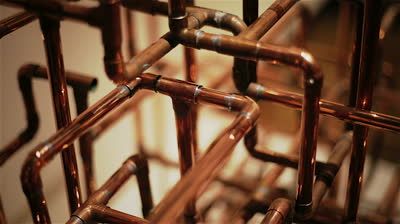Q: Since we have been on higher water pressure from a new source, we are getting more noise in the pipes. Not banging or clunking, just more water moving through the system faster, kind of a "rushing" noise. The pipe into the house is plastic, then hooks into copper pipe. The noise reverberates down the whole line, and since the pipe is strapped to the floor joists, it makes the noise under the kitchen, bathroom and one bedroom. I know about having a foot or so of capped pipe going up from a line to trap air and cushion the noise of "on" and "off" clunking, but this has me stumped. I am at the point now where I am about ready to rip the strapping off and putting foam around the pipes before I strap them back up. Before I spend the money on this, I thought I would check with you to see if that is what I need to do, or can you suggest something else?
Thanks very much.
A: A reduction of 1.5:1 (typically 3/4" to 1/2" is commonly used to increase or maintain water pressure throughout a house. The theory is that, given constant supply pressure, restricting volume will increase velocity. Released pressure at a fixture will be compensated for by this increased velocity.
I expect your hot and cold supply pipes are 1/2 inch diameter. What diameter is the plastic feed? If the reduction is greater than 1.5:1 it's quite likely that the velocity is great enough to cause noise in the pipe.
Check that all the shut-off valves (below the sinks etc.) are completely open. They too, can cause turbulence/noise by restricting water flow. Also, check all the pipes to see if there are any crushed or dented sections.
Foam wrap is a great for insulating purposes, but perhaps a little too soft for noise damping (it would crush flat). By all means, wrap the pipes, but use denser rubber for vibration pads. Extra bracing (for clamping to) might also help.
Alternative: Before you start pulling out nails, check the water velocity at your fixtures, and if it is extremely high, a pressure reducing valve can be installed on the supply line.
Visit my home inspection website at www.electrospec.ca


Comments(1)